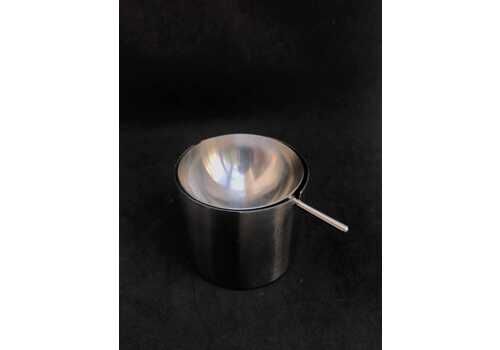Franco Albini Pl19 Or Tre Pezzi Armchair In Red Fabric By Poggi 1970s
£7,720 per item
Based on our pricing data, this item is above the recommended price.
Shopping at Vinterior
-
14-day return guarantee
-
Outstanding customer service
-
Secure payment
-
Buyer protection
-
Trees planted for every purchase

Item details
Height
92.0 cm
Width
84.0 cm
Depth
72.0 cm
Wear conditions
Good
Wear conditions
Excellent
Shows little to no signs of wear and tear.
Good
May show slight traces of use in keeping with age. Most vintage and antique items fit into this condition.
Average
Likely to show signs of some light scratching and ageing but still remains in a fair condition.
Apparent Wear and Tear
Visible signs of previous use including scratches, chips or stains.
Please refer to condition report, images or make a seller enquiry for additional information.
Description
PL19 or Tre Pezzi armchair with frame in black lacquered tubular steel, seat and back in padded red fabric.
Designed by Franco Albini and Franca Helg in 1959 for the Nuove terme Luigi Zoja in Salsomaggiore, Italy, and produced by Poggi, Pavia between 1964-70.
The PL19 armchair was exhibited at the XII Triennale of Milan in the 1960.
After spending his childhood and part of his youth in Robbiate in Brianza, where he was born in 1905, Franco Albini moved with his family to Milan. Here he enrolled in the Faculty of Architecture of the Polytechnic and graduated in 1929. He starts his professional activity in the studio of Gio Ponti and Emilio Lancia, with whom he collaborates for three years. He probably had his first international contacts here
In those three years, the works carried out are admittedly of a twentieth-century imprint. It was the meeting with Edoardo Persico that marked a clear turning point towards rationalism and the rapprochement with the group of editors of “Casabella”.
The new phase that that meeting provoked starts with the opening of the first professional studio in via Panizza with Renato Camus and Giancarlo Palanti. The group of architects began to deal with public housing by participating in the competition for the Baracca neighborhood in San Siro in 1932 and then creating the Ifacp neighborhoods: Fabio Filzi (1936/38), Gabriele D’Annunzio and Ettore Ponti (1939).
Also in those years Albini worked on his first villa Pestarini.
But it is above all in the context of the exhibitions that the Milanese master experiments his compromise between that “rigor and poetic fantasy” coining the elements that will be a recurring theme in all the declinations of his work – architecture, interiors, design pieces . The opening in 1933 of the new headquarters of the Triennale in Milan, in the Palazzo dell’Arte, becomes an important opportunity to express the strong innovative character of rationalist thought, a gym in which to freely experiment with new materials and new solutions, but above all a “method”.
Together with Giancarlo Palanti, Albini on the occasion of the V Triennale di Milano sets up the steel structure house, for which he also designs the ‘furniture. At the subsequent Triennale of 1936, marked by the untimely death of Persico, together with a group of young designers gathered by Pagano in the previous edition of 1933, Franco Albini takes care of the preparation of the exhibition of the house, in which the furniture of three types of accommodation. The staging of Stanza per un uomo, at that same Triennale, allows us to understand the acute and ironic approach that is part of Albini, as a man and as a designer: the theme addressed is that of the existenzminimum and the reference of the project is to the fascist myth of the athletic and sporty man, but it is also a way to reflect on low-cost housing, the reduction of surfaces to a minimum and respect for the way of living.
In that same year Albini and Romano designed the Ancient Italian Goldsmith’s Exhibition: vertical uprights, simple linear rods, design the space. A theme, that of the “flagpole”, which seems to be the center of the evolution of his production and creative process. The concept is reworked over time, with the technique of decomposition and recomposition typical of Albinian planning: in the setting up of the Scipio Exhibition and of contemporary drawings (1941) the tapered flagpoles, on which the paintings and display cases are hung, are supported by a grid of steel cables; in the Vanzetti stand (1942) they take on the V shape; in the Olivetti store in Paris (1956) the uprights in polished mahogany support the shelves for displaying typewriters and calculators. The reflection on this theme arises from the desire to interpret the architectural space, to read it through the use of a grid, to introduce the third dimension, the vertical one, while maintaining a sense of lightness and transparency.
The flagpole is found, however, also in areas other than the exhibition ones. In the apartments he designed, it is used as a pivot on which the paintings can be suspended and rotated to allow different points of view, but at the same time as an element capable of dividing spaces. The Veliero bookcase, built in a single prototype in 1940, has two main uprights, made up of slender curved and juxtaposed bars, linked by a complex tensile structure. The lightened upright is also found in the LB7 bookcase, produced by Poggi in the 1950s.
Like the evolution of the upright, also the decomposition and recomposition of the architectural elements and the use of the module, constitute the elements of a method that tends to simplify the complex phenomena of design down to the essential nuclei.
Albini is a complete designer, whose work ranges from construction to design, from installations to urban planning. Among his masterpieces are: the Genoese Museums that change the way the public uses the work of art, the Pirovano Refuge in Cervinia, the Rinascente in Rome and the Milan Metro, which inspires the projects of the New York and Sao Paulo.
Silent, rigorous, ironic man, Albini works incessantly, supported by a moral code that accompanies him throughout his career. He firmly believes in the social role of the architect as a profession at the service of the people. He considers it the very reason for its existence
Condition report:
Very good vintage condition
Additional dimensions information:
Height: 36.23 in (92 cm)Width: 33.08 in (84 cm)Depth: 28.35 in (72 cm)Seat Height: 16.15 in (41 cm)
Cancellations
We offer free cancellations and full refund for orders cancelled before dispatching. View full policy.
Returns
We have a 14-day return guarantee for orders from individual sellers, within the UK and European Union. View full policy.
Estimated delivery time
One to two weeks
Free collection available
Yes
Similar Armchairs
Similar Armchairs
You may also like
You may also like
Choose a Wishlist
Create Wishlist
- Selling at Vinterior since 2021
- Ships from Borgo a Buggiano , Italy
Cancellations and Returns
Last updated: 24th March 2025
We want everybody’s Vinterior experience to be seamless, so both buyers and sellers can fall in love with pre-loved. We designed our Terms of sale to treat everybody fairly.
However, sometimes things don’t go exactly to plan, and you may need to cancel or return an order.
To prevent this, we encourage you to check listings, photos and descriptions carefully before you buy. If you aren’t sure about a piece’s condition, size, provenance or shipping, just ask; click Contact seller to get in touch. Always contact your seller first if you have any queries, at any point in your purchase.
Our buyers receive the same protection when buying from all our sellers, both professional and verified.
Can I cancel an order?
There are many reasons why you might need to cancel an order, and you'll often be entitled to a refund. To cancel an order, click Create cancellation on the order page.
If you cancel your order before it has been dispatched, you will receive a full refund - including delivery costs. However, if your item has been shipped, delivery costs will not be included in your refund.
Please note: orders of bespoke, personalised or made-to-order pieces cannot be cancelled.
Can I return an order?
We understand that sometimes a piece isn’t the perfect fit. So if you no longer want your order, our returns process will ensure it finds a new home fast.
The Vinterior Guarantee included with your purchase entitles you to 14-day returns - allowing you to return any item within 14 days of the delivery date (except in specific circumstances, detailed below).
You can return your order if...
It isn't what you expected
If what arrives isn’t what you ordered, you can open a return. Just send us some photo evidence that the listing was inaccurate, misleading or misrepresented your purchased piece, and you’ll receive a refund.
You change your mind
If you don’t feel a piece is right for your space, you can return it. Once you request a change of mind return, you’ll be responsible for shipping the piece back to your seller as soon as possible. Delivery costs are non-refundable.
It's damaged in transit
In the rare event that an item arrives damaged or defective, you have a full 30 days from the date of delivery to return it for a full refund.
If your purchase arrives broken, always let us know. If Proovia delivered the piece, we can raise an insurance claim on the seller’s behalf. Or, the seller can raise a claim with their chosen courier.
What can't I return?
Just as there are some orders you can’t cancel, there are some you cant return, too. Personalised, bespoke or made-to-order pieces are non-returnable, and non-refundable. Sellers may also reject your return if the item has been altered in any way.
Please note: pieces on our site are pre-loved, not new. They may show some wear and tear; this is not sufficient grounds for a refund, unless the seller has misrepresented the item’s condition.
Lastly, neither Vinterior nor our sellers are liable for any damages or loss sustained in transit via third parties.
I'm eligible for a return. Now what?
To initiate a return, log into your Vinterior account, then go to the relevant order page and click Create a return. In the return request, be sure to include all the details: the reason for your return, an in-depth description, and photos of any issues or damage.
How will I receive my refund?
Once the seller confirms they’ve received the item (in the same condition it was sent), we will send your refund to your original payment method.
All items are inspected on return. If the seller receives the return with damage they don’t recognise, we will not be able to process your refund and the seller may need to send the piece back to you. You will be required to cover these delivery costs.









